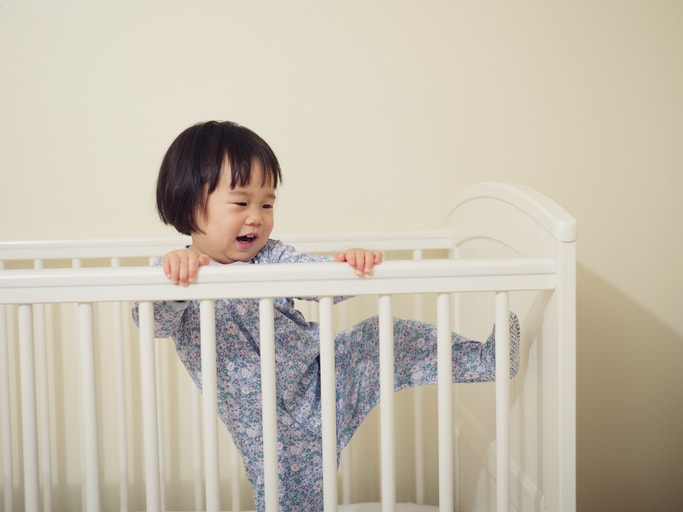At the end of the summer, when it’s been months since kids have been in the classroom, the mounting anticipation of a new school year can set off a flurry of feelings — from excitement to nervous butterflies to full-on anxiety. It’s, of course, natural for kids to feel these emotions, but if your child is experiencing extreme stress, it’s important to understand the cause and help them work through it.
In general, kids are afraid of one thing, explains Adelle Cadieux, Psy.D., a pediatric psychologist with Spectrum Health Helen DeVos Children’s Hospital: “Fear of the unknown is the root cause of most anxiety. It’s that way for everyone, even adults. And some kids are just naturally more nervous than others, so transitions like going back to school will be more difficult for them.”
Fear of the unknown can be amplified at transitional points in a child’s academic career, notes Ana Jovanovic, a licensed psychotherapist with ParentingPod, an online resource for parents on mental health and wellbeing.
“Important transitions, such as going to first grade, the beginning of middle school or the start of high school can be anxiety provoking for many kids,” Jovanovic says. ”If you think about it, stepping into a new environment in which you are not sure how exactly to position yourself can be tricky even for adults.”
Kelly Kamenetzky, a mom of three from Los Angeles, attests to this being the case for her 7-year-old son who started first grade this year.
“He was nervous about the unknown in general — new teacher, new space, new kids he hadn’t yet met,” she says. “So, we arranged a time to visit the school, meet his teacher, see his classroom ahead of time.”
Anxiety can hit older kids just as hard.
“My oldest is going into junior high next year, and she’s already worried about having a locker, remembering the combination and switching classes,” says Malori Avery, a mom of three from Peoria, Illinois. “I told her we will have plenty of time the week before school to organize her locker and walk around so she knows where her classes are.”
Here are common back-to-school stressors kids face and what parents can do to help ease their minds.
1. Separation anxiety
Children who are in grades K-3 are especially prone to stressing about being away from their parent or caretaker for the duration of the school day. This is also known as separation anxiety.
“[This age group] has a hard time transitioning back to school because they have been taken care of at home in ways that don’t encourage independence and self-reliance,” says Dr. Jeanette Raymond, a clinical psychologist and family therapist in Los Angeles. “They will be navigating the area between dependence and some self-care.”
It also bears noting that this is the kind of back-to-school stressor that kids aren’t necessarily going to be quick to articulate. Raymond says that when working with families last fall, she learned that some children “were too scared to tell their parents that they worried about their parents missing them. Kids’ fears weren’t at all to do with school — it was separating from their parents.” She points out that “kids take care of their parents emotionally in ways that parents are oblivious of.”
What you can do: Modeling healthy ways of dealing with time apart is key to addressing this anxiety, notes Christie Jenkins, a licensed professional clinical counselor (LPCC) and faculty member at Walden University.
“Respect your child’s feelings, but help them to grow without you,” she says. “When they are home from school, tell them what a good job they did, and set some time aside to spend with your child doing such activities as coloring, playing a game or watching their favorite program together.”
2. Adapting to a new environment and community
Whether a child is starting school for the first time, starting at a new school or going to a new school system after a move, they may experience anxiety around how social life will develop and what it will look like.
“Anxieties can include how to make friends, will others like me — basically not knowing what the new experiences will be like,” Cadieux says.
What you can do: To ease this stressor, Cadieux recommends:
-
Parents participate in school open houses or meet-and-greets with teachers.
-
If the school does not offer this, discuss with the school or teacher about having your child meet the teacher, see the classroom or walk around the school.
-
Talk to your child about what the first day might be like and what it will be like after several days or weeks to help them see that at first there will be some unknowns.
-
From there, explain that as school continues, they will learn and get used to all the new experiences.
Kamenetzky says her son learned in a social skills group to bring a small magic trick, kids’ joke book or “something to get the interest of the other kids that would be an easy icebreaker” to school if he was nervous about making friends or having trouble mingling with other kids.
She also found that her son’s school was more than happy to set him up with a peer guide.
“We asked the school if they could pair him with a buddy who knew the ropes, and they did,” she says. “They made sure he was sitting next to this boy in class and at lunch. He was like my son’s personal ambassador to the school.”
3. Fears about peers
“Peer interactions, making choices in friends, activities and dating can contribute to significant anxiety,” says Cadieux.
Anytime up through fifth grade, these anxieties are particularly heightened, according to Raymond.
“These kids are more focused on peer group changes,” Raymond says, that include worries like:
-
Will I have the same friends?
-
Will we sit next to each other in class?
-
Will others try to be superior?
-
Will there be issues around sports and academic life?
-
Will I be or not be teacher’s pet?
-
Will I have the right tech stuff or not?
-
Will I be wearing the “in” clothes and accessories?
These issues can “break their emotional stability,” says Raymond.
Avery says her 8- and 11-year-old daughters are especially concerned about wearing on-trend fashion.
“My kids are always worried about having a cool wardrobe,” she says. “First-world problems! But that’s all I hear before school starts. ‘So and So has jeans from the Buckle/Hollister/American Eagle.’ ‘So and So has a Coach bag or Nike shoes.’”
During the transition to middle school, concerns related to adolescence and identity can fuel fears around peer interaction, as well.
“Girls may be starting their periods, and many will fear their classmates knowing, getting teased, etc.,” Raymond says. “Boys get dared to be forward with the opposite sex. Children who are gay or transgender may have a particularly hard time heading back to school, especially if they haven’t come out to their parents.”
What you can do: Raymond recommends open communication and interaction around these subjects by trying the following:
-
Talk to your kids about your own experiences in school.
-
Do role-playing exercises in which you take on the roles of the peers your kids are concerned about.
-
Encourage kids to imagine what school and peer interactions will be like.
-
Have kids reflect on their concerns in private spaces, like journals or photographic essays, which can be containing and soothing.
-
Rehearse how to deal with each of the issues your kids bring up.
“Rehearsing these scenarios builds confidence, and the act of imagining and rehearsing it often removes the stressors, because bringing them into the real world makes them less stressful than they are hidden in their heads,” says Raymond. “Parents shouldn’t pry or expose their kids’ worries, as that just mortifies them and makes matters worse.”
4. Riding the bus
Younger children or those attending a new school are especially susceptible to anxiety related to taking the bus to school, given that it is an unknown.
“This can be stressful since children may have long bus rides with other students that they are not necessarily friends and with students of varying ages,” says Cadieux.
What you can do: There are several ways you can ease your child’s mind about their daily “commute,” and Cadieux specifically recommends:
-
If your child has never ridden a bus before, talk to them about what they can expect.
-
Help your child by identifying a sibling, friend or neighbor that will also be on the bus and can provide support.
-
Identify activities to do on the bus, especially if it is a long bus ride.
-
Talk with your child’s teacher and bus driver about concerns and build a relationship with them so that they, too, can support your child in riding the bus.
5. Bullying
Although kids may be concerned about bullying even before experiencing it, this tends to be an anxiety stemming from a past experience.
“Students who have experienced bullying in the past may have anxiety with school resuming and having to deal with bullying again,” Cadieux says, pointing out that the experience “can have a significant effect on self-esteem and mental health.”
What you can do: “Develop a plan with your child and the school what the child can do if bullying occurs and how the school will respond,” Cadieux says.
It can be difficult to preempt bullying from happening in the first place, but you can go over how you’ll proactively address it, should it occur.
“We cannot always prevent our children from becoming targets at school, but we can help them with their reaction to the bullying,” says Jenkins, who also advocates having a plan in place. “Tell your child to tell a trusted adult at school. When your child comes home, talk to them about what transpired and how you can help at home.”
How to deal with ongoing school-related stress
If these or other anxieties continue to weigh on your child once school has started, you’ll do well to chat with their teachers and the school principal, Cadieux says.
“It’s helpful for them to be aware, and there may be ways they can help make the school environment more comfortable for your child,” she says.
And if anxiety becomes severe, you may want to talk to your child’s pediatrician and consider family counseling.
“Counseling can help your child learn how to deal with their stress,” Cadieux says. “These feelings often come out as behavioral issues like extreme anger, irritability and defiance.”
But counseling can help both kids and parents learn how to best cope.
Read next: 5 warning signs your kid is overscheduled






